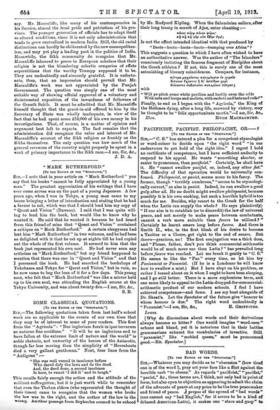SOME CLASSICAL QUOTATIONS. [To TBR EDITOR CF THE "SPECTATOR.")
Sin,—The following quotations taken from last half's school work are so applicable to the events of our own time that they may be of interest to some of your readers. This first from the "Agricola": "Nee inglorium fuerit in ipso terrarum ac naturae fine cecidisse." "It will be no inglorious end to have fallen at the extreme limit of nature and the world" is noble rhetoric, not unworthy of the heroes of the Antarctic, though far less moving than the simplicity of "Hereabouts died a very gallant gentleman." Next, four lines from the "Antigone ":—
" She was well versed in insolence before 'Who dared defy the laws and do the deed. And, the deed done, a second insolence Is here, to vaunt 'I did it' and to laugh."
This recalls fairly enough the action and the attitude of the militant suffragettes; but it is just worth while to remember that even the Theban elders (who represented the thought of their times) came to recognize that the woman who broke the law was in the right, and the author of the law in the wrong. Armtlaer passage from Sophocles seemed to be echoed by Mr. Rudyard Kipling. When the Salaminian sailors, after their long tramp in search of Ajax, enter chanting :— Ircfros s-bv arbor Olpfe aq vi 7ap oinc 1137p, 4Z; Is not the effect intended identical with that produced by' "Boots—boots—boots—boots—tramping over Africa"?
This suggests a question to which I have often wished to have an authoritative answer. Was the author of "The Islanders" consciously imitating the famous fragment of Euripides about the Greek athletes ? If not, this is surely one of the most astonishing of literary coincidences. Compare, for instance,
irjvcpct FaxoUrrat IroAEpioicrir war Sit:MOUT EXOY7fS Se ?miaow xfpl Oefvoirres bc0a2toiicrs rokepiovs Tcfrpas ;
with "Will ye pitch some white pavilion and lustily even the odds With nets and hoops and mallets, with rackets and bats and rods ? "
Finally, to end as I began with the "Agricola," the King of the Hellenes dying, after a long life, crowned by victory, may- be thought to be " felix opportunitate mortis."—I am, Sir, &c.,










































 Previous page
Previous page